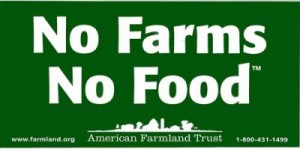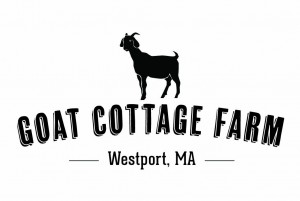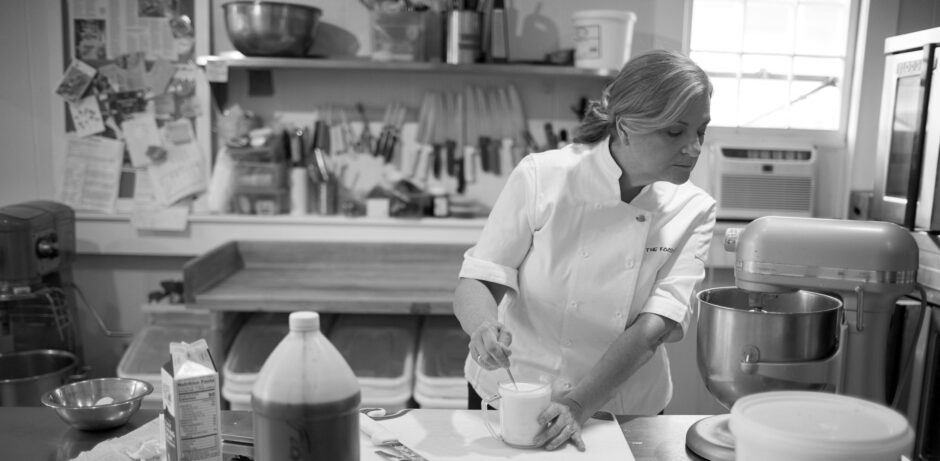After years of turning my nose up at bumper stickers and their stupid sentiments like “I Love My (Dog’s Head)” and “Ask Me About My Grandchildren,” I succumbed. It came in the mail a few months ago with a thank you from the American Farmland Trust for my donation. It reads, “No Farms, No Food.”
No kidding, right?
It also covered up a sticker advertising my old Saab dealership, so it’s not like I’ve jumped ship to the Green Party. But I respect farmers. Always have. And these days, I’m more in awe of them.
Last week, I joined my partner Colleen at a free wholesaling event for farmers put on by Mass. Farm to School and FamilyFarmed.org. Long story short — I walked away with a free 315-page workbook and bushels more respect for people who work their land.
Yes, there were farmers in the room who appeared to have been plucked out of Central Casting – I think I was the only attendee wearing mascara – but amongst them sat a new breed of aggies. There were young guys and gals who took notes on tablets and debated the best app to use for the insane amount of record keeping they all must do, especially for certified organic farms. Apparently, AgSquared is a favorite but AgSquaredPlus is on the horizon.
Food safety issues were a hot topic. Organic farmer Atina Diffley, an ubersuccessful Minnesota farmer, instructed us in everything from where to put compost piles and farm animals vis-à-vis the growing fields to proper hand-washing techniques and, yes, record keeping.
“Traceability is key in wholesaling,” she said, adding that if a customer is felled from a contaminated fruit or veg, all heads turn to the farm. You’ve got to know where the offensive produce was grown, how it was handled, who washed it, where it was washed, how it was shipped. The list is endless.
Everyone was aware of the Great Cantaloupe Scare of 2011 when 30+ people died from eating melon grown at Jensen Farms in Colorado that was infected with listeria. The farm filed for bankruptcy, victims sued and the brothers who owned the farm were arrested by the feds for sending tainted food into the marketplace. (They got probation.) Farmers are accountable? You betcha.
During lunchtime, we were given the opportunity to chat up wholesalers looking for products such as reps from gourmet food purveyor Sid Wainer of New Bedford and FarmFresh.org, which distributes locally-farmed produce to chefs and retailers from a warehouse in Pawtucket, R.I. The opportunities are out there. Now we just need to plant those fields at Goat Cottage Farm!
Finally, I was amazed at the resources for the commonwealth’s 7,700 farms available through the Mass. Dept. of Agricultural Resources. The state also can help with an USDA audit for the Good Agricultural Practices and Good Handling Practices certifications. And, more importantly, Michael Botelho, who is in charge of the state’s CommonwealthQuality program, an excellent marketing tool for farmers, didn’t sound like a hack! Shocking, I know.
We also gleaned some practical information about setting up contracts with retailers. It doesn’t have to be fancy, but printing invoices with specific return and payment policies on the bottom are key. It’s also serves as a legal contract. Good stuff to know, don’t you think?
So I guess I’m also going to try my (thoroughly washed) hand at farming with Colleen this spring. I suppose I will need to escape from the commercial bakery (fingers crossed!) at some point. However, I have drawn a line under beekeeping. My partner already has ordered up two hives. Now, while I do like a good wide-brimmed hat, yellow jackets scare me.
But I do know that we should probably keep the bees away from the compost pile…
Tags: #altinadiffley, #beekeeping, #farmersmarkets, #FarmFreshdotorg, #farming, #farmtoinstitution, #FINE, #Mass.Farms, #MassFarmtoSchool, #sidewainer, #wholesaleproduce, Farms


Excellent post. And best wishes to Goat Farm Bakery as it begins its first full season. Sounds as though you made several helpful and outstanding contacts in a very short time! P.S. I share your fear of yellow jackets, hence am always willing to pay top dollar for honey from locally sourced hives and bees. Buzz out.